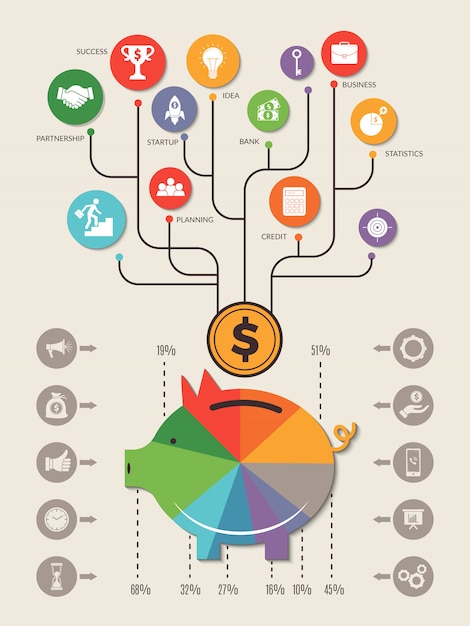Think Tanks & Public Policy: Unveiling Agendas & Funding in the US

Examining the Role of Think Tanks in Shaping Public Policy: Who Funds Them and What is Their Agenda? reveals that these influential organizations significantly impact policy discussions through research and recommendations, often with funding sources and specific agendas shaping their outputs in the US context.
The realm of public policy in the US is a complex web influenced by numerous actors. Among these, think tanks play a pivotal role, often operating behind the scenes. Examining the Role of Think Tanks in Shaping Public Policy: Who Funds Them and What is Their Agenda? is crucial to understanding their impact.
Understanding the Influence of Think Tanks on US Policy
Think tanks are research institutes that perform analysis and advocacy on a variety of public policy issues. Their influence stems from their ability to translate complex information into digestible formats for policymakers and the public. They provide research, analysis, and recommendations that can shape the direction of public policy debates in the US.
The Role of Research and Analysis
Think tanks conduct in-depth research on a wide range of policy topics, from economics and foreign policy to healthcare and education. This research often forms the basis for policy recommendations and advocacy efforts.
Providing Expertise to Policymakers
Think tanks frequently serve as a source of expertise for policymakers, providing them with data, analysis, and recommendations that can inform their decisions. They often testify before Congress, provide briefings to government agencies, and publish reports that are widely circulated among policymakers.
Think tanks are incredibly influential in shaping the political landscape, and it is important to understand the nature of the role:
- Influence: Think tanks directly or indirectly influence legislation.
- Contributions: They also contribute to public awareness and understanding.
- Credibility: Neutral expertise or biased partisanship?
In conclusion, think tanks exert considerable influence on US policy by providing research, analysis, and expertise to policymakers. Understanding their role is essential to comprehending the dynamics of public policy formation in the United States.
Funding Sources: Unveiling the Financial Backers
The question of who funds think tanks is paramount, as funding sources can significantly influence the research produced and the policy positions advocated. A diverse range of entities support think tanks, each with their own motivations and interests. Transparency in funding is a critical aspect of assessing the credibility and objectivity of think tanks.
Private Foundations and Individual Donors
Many think tanks receive funding from private foundations, such as the Ford Foundation, the Bill & Melinda Gates Foundation, and the Charles Koch Foundation. Individual donors also contribute significantly to the financial support of think tanks. These sources can provide substantial funding but may also come with specific agendas.
Corporate and Industry Funding
Corporations and industry groups often fund think tanks to advance their interests. This funding can take the form of grants, sponsorships, or research contracts. While such funding is not inherently problematic, it can raise concerns about potential bias in the research and policy recommendations produced. Understanding the source is important as companies might utilize data in their favor.
- Foundations: Grants based on specific goals or ideologies.
- Corporate: Sponsorships that push for specific viewpoints.
- Individual Donors: Large donations that may also sway research.
Being able to identify the funding sources of think tanks enables the public to fully understand if the group is truly neutral or has an underlying motivation.

In summary, the funding sources of think tanks are diverse, ranging from private foundations and individual donors to corporations and industry groups. Identifying these financial backers is crucial to understanding potential biases and agendas that may influence the research and policy recommendations produced.
Political Agenda: Identifying Core Ideologies
The political agenda of a think tank refers to its underlying ideology and policy priorities. Understanding this agenda is crucial for interpreting the research and recommendations produced by the organization. It is important to recognize that most think tanks advocate for specific policy outcomes aligned with their core beliefs.
Liberal and Conservative Think Tanks
Think tanks often align themselves with specific political ideologies, such as liberalism or conservatism. Liberal think tanks generally advocate for policies that promote social justice, environmental protection, and government regulation. Conservative think tanks typically favor policies that emphasize individual liberty, free markets, and limited government.
Examining Policy Positions
To identify the political agenda of a think tank, it is essential to examine its policy positions on various issues. This can be done by reviewing the organization’s publications, statements, and public appearances. Analyzing the language used and the arguments presented can provide insights into the underlying ideology.
Different kinds of Think Tanks have different strategies and goals:
- Liberal vs. Conservative: Promoting different frameworks and values.
- Policy Focus: Economic, social, or environmental focuses.
- Bias Identification: Recognizing advocacy and partisanship.
In conclusion, understanding the political agenda of a think tank is critical for interpreting its research and recommendations. It is important to recognize that most think tanks advocate for specific policy outcomes aligned with their core beliefs, and this can influence their work.
Transparency and Accountability: Evaluating Credibility
Transparency and accountability are vital for evaluating the credibility of think tanks. When think tanks operate with transparency, it allows the public to scrutinize their funding sources, research methodologies, and potential biases. This scrutiny is essential for ensuring that think tanks are held accountable for the quality and objectivity of their work.
Disclosure of Funding Sources
One of the most important aspects of transparency is the disclosure of funding sources. Think tanks should be willing to reveal who funds their operations, including private foundations, corporations, and individual donors. This disclosure allows the public to assess whether the funding may be influencing the research and policy recommendations produced.
Research Methodology and Data Sharing
Another crucial aspect of transparency is the disclosure of research methodology and data. Think tanks should be willing to share the methods they use to conduct research, including the data sources, analytical techniques, and assumptions made. This transparency enables other researchers and the public to evaluate the validity and reliability of the findings.
A variety of factors play a role in assessing a Think Tank:
- Funding Transparency: Open and detailed disclosures.
- Methodological Transparency: Clear and replicable research methods.
- Independence: Insulating the group from external pressures.
In summary, transparency and accountability are essential for evaluating the credibility of think tanks. Disclosing funding sources and research methodologies enables the public to scrutinize their work, while mechanisms for accountability ensure that they are held responsible for the quality and objectivity of their research.
Impact on Public Opinion and Media Narrative
Think tanks play a significant role in shaping public opinion and influencing media narratives. Through their research papers and public presentations, think tanks present information, interpret data, and frame issues in ways that align with their agendas. Understanding how think tanks influence public opinion and media narratives is essential for critically assessing the information we consume.
Framing of Issues and Policy Debates
Think tanks often play a role in framing issues and shaping policy debates. They strategically select the language and arguments they use to present information in a way that supports their desired policy outcomes. This framing can influence how the public perceives the issue and, ultimately, how policymakers respond.
Relationship with Media Outlets
Think tanks frequently collaborate with media outlets to disseminate their research and analysis. They issue press releases, provide expert commentary, and publish op-eds in newspapers and online platforms. These collaborations can amplify the reach of think tank research and influence the way issues are covered in the media. The more media exposure, the higher likelihood of their points making impact on wider groups of people.
Think Tanks influence the public in a series of ways including:
- Media Amplification: Working with media outlets and commentators.
- Strategic Framing: Outlining the topic in a way that favors a particular viewpoint.
- Data Interpretation: Providing analysis that supports political goals.
In conclusion, think tanks have a significant impact on shaping public opinion and influencing media narratives. Their strategic framing of issues and their collaboration with media outlets can amplify their reach and influence the way policies are discussed.
Case Studies: Examples of Think Tank Influence on Specific Policies
Examining case studies of think tank influence on specific policies can provide concrete examples of how these organizations operate and exert their impact. These case studies illustrate the diverse ways in which think tanks contribute to the policy-making process and the potential consequences of their involvement.
The Heritage Foundation and Tax Reform
The Heritage Foundation, a conservative think tank, played a significant role in shaping the Tax Cuts and Jobs Act of 2017. The foundation’s research and policy recommendations provided intellectual ammunition for the tax cuts, arguing that they would stimulate economic growth. The Heritage Foundation’s influence illustrates how think tanks can shape major policy changes through research and advocacy.
The Brookings Institution and Healthcare Policy
The Brookings Institution, a center-left think tank, has been influential in shaping healthcare policy debates. Brookings scholars have published numerous reports and articles on topics such as the Affordable Care Act, Medicare reform, and prescription drug pricing. Their research and analysis have informed policymakers and contributed to the evolution of healthcare policy in the US.
Looking at ways Think Tanks affect real world examples is the best case for understanding them:
- Tax Policy Changes influenced by targeted groups advocating for their view points.
- Healthcare Legislation: Contributing evidence that guides reform initiatives.
- Environmental Regulations being affected based on data analysis and suggestions.
In summary, case studies of think tank influence on specific policies provide concrete examples of how these organizations operate and exert their impact. By examining their involvement in tax reform, healthcare policy, and environmental regulations, we can gain a deeper understanding of the diverse ways in which think tanks contribute to the policy-making process.
| Key Aspect | Brief Description |
|---|---|
| 💡Influence | Think tanks shape policy by providing research and expertise. |
| 💰 Funding | Funding comes from foundations, corporations, and individuals. |
| 🎯 Agenda | Ideologies range from liberal to conservative. |
| 🔍 Transparency | Disclosure is vital to evaluate think tank credibility. |
Frequently Asked Questions
▼
A think tank is an organization that conducts research and engages in advocacy concerning topics such as social policy, political strategy, economics, military, and technology. They often inform public and private decision-making.
▼
Think tanks influence public opinion by issuing reports and media releases, providing expert commentary, and collaborating with journalists to frame issues. Their outputs can significantly shape public perception.
▼
Knowing who funds a think tank is crucial to determine potential biases. Funding sources can influence research priorities and policy recommendations, affecting the objectivity of their findings.
▼
While many think tanks have a clear political leaning (liberal, conservative), some identify as non-partisan. It’s crucial to assess each tank’s alignment to understand potential biases in its analysis.
▼
Yes, think tanks can positively impact society by providing well-researched and informed policy recommendations. They can also stimulate public dialogue and help policymakers make evidence-based decisions.
Conclusion
In conclusion, the role of think tanks in shaping public policy is undeniable. Their funding, agenda, and influence on media narratives all contribute to their impact. By understanding these factors, we can better evaluate the information they provide and make more informed decisions about the policies that affect our lives.
